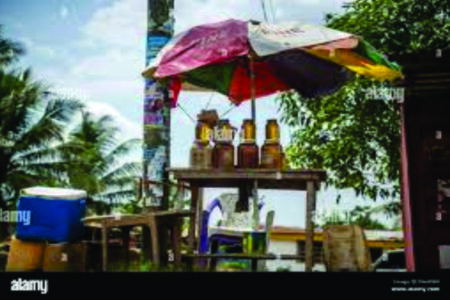By Precious D. Freeman
Several Liberians are calling on the government to take immediate action to curb the rising danger posed by petty gasoline sellers along the country’s roads.
The sale of gasoline at roadside stands, known as “sidewalk” selling, has become a growing concern, with citizens warning that it not only creates safety hazards but also contributes to the escalation of violence in the community.
As Liberia continues to face socio-economic challenges and unrest, the practice of selling gasoline on street corners, which often lacks regulation and oversight, has become increasingly common.
Sidewall gasoline sellers, alias “can boys” who are typically informal vendors, offer small quantities of fuel to motorists and passersby, usually in containers or plastic bottles. While it provides a convenient and sometimes cheaper option for those in need, it carries significant risks that have citizens on edge.
In an interview with Mr. Edwin Kollie, a concerned citizen, he highlighted the alarming trend of increasing violence across Liberia.
Kollie expressed concern that people are quick to resort to violence during disputes and noted that it’s becoming common for individuals to use anything within reach as a weapon.
“These days, Liberians are always killing one another with anything they can get their hands on whenever they get into a fist fight. It’s becoming common, and they might one day pick up gasoline and use it against others,” Kollie warned.
The danger lies in the accessibility of gasoline at these roadside stands, which poses not only a threat to personal safety but also to public order as well.
“Imagine someone in the heat of an argument, reaching for a bottle of gasoline and pouring it onto another person’s vehicle, or worse, throwing it on someone in anger,” Kollie explained. “It’s a potential disaster waiting to happen.”
Kollie also pointed to the recent spike in violence during protests as an additional reason to be concerned.
“With frequent protests and the growing frustration among the population, especially the youth, one day, protesters may use gasoline, sold openly on the sidewalks, to attack security forces or even each other. This is a grave concern for the safety of all Liberians,” he stated.
Gasoline is highly flammable, and its improper handling only heightens the danger.
Selling gasoline at these unregulated roadside locations exposes both the sellers and the community to extreme fire risks, particularly as it’s often stored in makeshift containers that are not designed for safe fuel storage.
The volatile nature of gasoline means that even small amounts of vapor can ignite and lead to devastating fires or explosions.
This hazard becomes even more acute with the presence of vehicles, which are a constant source of potential ignition.
Motorbikes, which are commonly used for transportation in Liberia, are often seen filling up at these roadside stands.
The risk is further compounded by the congested streets and unpredictable traffic conditions, where an erratic driver or a simple spark could lead to catastrophic consequences.
Beyond the safety concerns, Kollie also spoke out about the social and economic implications of sidewalk gasoline sales.
“The government’s failure to regulate this practice is contributing to the cycle of lawlessness in the country. It’s clear that many people involved in selling gasoline this way are operating without any proper licensing or safety measures, and this is making our communities unsafe,” Kollie stated.
The rise in violent clashes, particularly among motorcycle riders, has also been linked to the availability of gasoline on the streets.
It is not uncommon for motorcycle riders involved in accidents or conflicts to retaliate by setting vehicles on fire or attacking other parties involved.
“When a motorcycle crashes into a truck, and something happens to the rider, the next thing we see is the other motorcyclists setting the truck on fire. This is not just an isolated incident; it’s a regular occurrence that highlights the danger of gasoline being so readily available,” Kollie explained.
This reckless behavior is being fueled by the unrestricted access to gasoline at these roadside stands.
Some Liberians fear that these incidents of arson could escalate into even more severe acts of violence.
“If the government doesn’t step in now, we might be facing larger-scale riots or attacks where gasoline becomes the weapon of choice,” said another concerned citizen, who wished to remain anonymous.
According to Kollie, the government must act swiftly to regulate or even eliminate sidewalk gasoline sales.
“If the government can take action to stop the sale of gasoline on the sidewalks, it would be a significant step toward ensuring the safety and peace of our nation,” he urged.
Kollie believes that instituting strict regulations on fuel sales, including requiring proper permits and safety measures for sellers, would greatly reduce the risks associated with roadside gasoline commerce.
The call to action has garnered support from many Liberians, particularly those in urban areas like Monrovia, where sidewalk gasoline selling is most prevalent.
“The government has the responsibility to protect its citizens,” said another local resident. “We need regulations that ensure safety, and if necessary, a complete ban on these roadside sellers.”
The growing concern over roadside gasoline sales has become a hot topic among Liberians, with many demanding stricter regulations and enforcement.
Experts agree that without proper controls, the potential for these sales to lead to disastrous consequences is high.
As pressure mounts on the government, citizens hope for swift action to address this dangerous practice before it leads to even more devastating consequences.
While the government has not yet made any formal announcements regarding potential regulations, the increasing calls for action suggest that this issue will continue to dominate public discourse in the coming weeks.
Whether or not immediate changes will be made, Liberians are united in their desire to see a safer, more secured environment for all.
Gov’ Urged To Address Dangers Of Sidewalk Gasoline Sale
